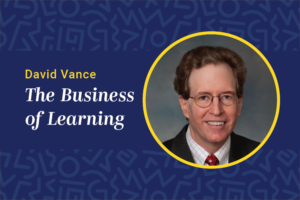
 Some in our profession have not had the opportunity to work closely with senior leaders like a CEO or CFO. With that in mind, I would like to share some observations about senior leaders from my experiences at Caterpillar Inc. — first as the chief economist and later as the CLO — and at other companies since then. Of course, my sample size is small, thus it may not be representative of all CEOs, but I believe most will share the following traits.
Some in our profession have not had the opportunity to work closely with senior leaders like a CEO or CFO. With that in mind, I would like to share some observations about senior leaders from my experiences at Caterpillar Inc. — first as the chief economist and later as the CLO — and at other companies since then. Of course, my sample size is small, thus it may not be representative of all CEOs, but I believe most will share the following traits.
First, despite their very lofty position, they are still just people. Now, I know that some CEOs believe they have transcended to a whole new level of existence, but in my experience, most were down to earth, and you could talk with them. This doesn’t mean you can waste their time because it is incredibly valuable, so you need to be prepared and be clear about you want from them.
At the same time, you don’t need to memorize a script or be scared to death about the meeting. It is okay to ask questions and with most it is okay not to have all the answers. Because they are people, don’t be surprised if they ask questions about your family or interests in addition to work. They really do want to know more about you, and some personal connection time breaks up their day, which is otherwise filled with 10-12 hours of work-related issues. So, relax a little bit and enjoy the time you get with them. And be prepared to be surprised at what you learn about them and the organization.
Second, they have a very high tolerance for some uncertainty and ambiguity. Their tolerance will almost certainly be much greater than yours because they have to deal with it every single day. Having said that, you need to provide some context. They will not have a high tolerance for you being unprepared, acting unprofessionally or making excuses. They will, however, understand that a plan for next year is just that: a plan.
They know from experience that plans are usually wrong because something unexpected happens. Risk cannot be eliminated because of fundamental uncertainties about the future, but it can be managed. That starts with ensuring you have a good process for planning, and that you have talked with the right people. So, expect questions about how you came up with the plan and who you talked to.
If you talked to the right people, like the senior vice president of sales, to agree on an outcome measure and made reasonable assumptions, they are going to feel good about the plan. Put differently, there is nothing they can do to guarantee a perfect plan. Instead, focus on what you can influence, process and people. So, be humble in setting and communicating plans. Don’t worry that they are not perfect.
Third, CEOs know you are going to make some mistakes along the way. They themselves are still making mistakes, as are other senior leaders, so it is only natural that you will, too. Unless you believe you are far superior to them?
Many in our profession are afraid the CEO is going to discover they are not perfect. Thus, they are afraid to share talent development reporting principles, or TDRp-type reports, which may show that every measure is not on track to meet plan. News flash: Your CEO already knows you are not perfect, and they don’t expect you to achieve or exceed plan on every single measure.
In fact, any good leader would be skeptical of someone who says they always achieve or exceed plans because that is not how the world works. Unless you set incredibly easy targets to meet, you are going to achieve some, exceed some, and fall short on the rest. This is what your CEO is expecting. I met with our Board of Governors, CEO and other senior leaders each quarter, and I never reported that we were on plan to achieve or exceed all measures.
Likewise, as an economist it was impossible to get all the forecasts right. Since your CEO already knows this they will be looking to see if you are honest and transparent, willing to share the bad news as well as the good news. They will then want to see if you can address those areas where you are behind without being defensive or blaming anyone else. They want to know that you are on top of the issues and are doing everything that makes sense to deliver the planned results. So, don’t worry about letting the CEO see you are not perfect. Instead, show them you can manage L&D like business.
I hope this makes you a little more confident and at ease about meeting and interacting with your CEO and other senior leaders. At the end of the day they are just people just like you, planning in the face of uncertainty, making mistakes, and moving forward in spite of it all.
David Vance is the executive director for the Center for Talent Reporting, founding and former president of Caterpillar University and author of “The Business of Learning.” To comment, please email editor@CLOmedia.com.




